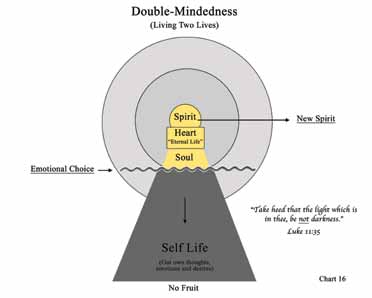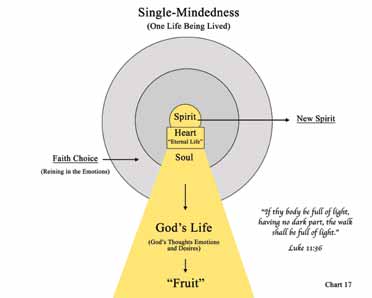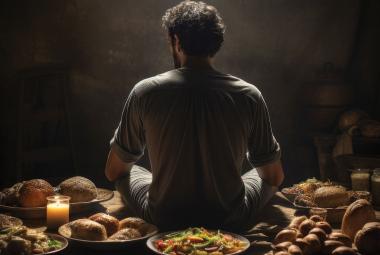Last month we began a three-part series on the Parable of the Ten Virgins. This is part of our ongoing survey of our book, The Kingdom, Power and Glory. This particular parable is very controversial and many good scholars see it very differently than we do. So again, be as the Bereans and see what the Holy Spirit confirms to you.
We talked last issue about the importance of being prepared, fit and ready for Christ’s imminent return. This is the time the Lord will choose His Bride and present her to Himself as “having no spot or wrinkle and being holy and without blemish” (Ephesians 5:27).
Keep in mind, the Scripture talks about two different types of garments that a believer must wear. The Garment of Salvation that gets us into heaven in the first place, and then, the White Linen Garment that is made up of a believers own “righteous works” or “fruit” (Revelation 19:7-8).
The first garment speaks of our “salvation” (Isaiah 61:10); the second garment speaks of our “sanctification” (2 Corinthians 7:1; 11:2).
The “holy ones without blemish” are those believers who have chosen to daily be sanctified in order to keep themselves clean, prepared and ready for the Lord’s return. They have continued to “put off” their sin and self, and “put on” Christ.
They are not “perfect” by any means, but have simply “put on” the One who is perfect and that’s Christ.
The whole Bible stresses the importance of our being prepared, faithful and ready for the Lord’s return. The Parable of the Ten Virgins is one of those many pas-sages:
All Ten Virgins Were Believers
All ten virgins in this parable represent born-again, Bible-believing, Christian believers preparing themselves for passage into glory.
Virgin actually means “unmarried, undefiled, clean, chaste, and pure.” The unsaved are not virgins! This means that all ten virgins had on “Christ’s garment of salvation” (Isaiah 61:10). This is the robe of righteousness that got them into heaven in the first place.
They were all followers of Christ and they all went out to meet Him, which showed their belief in the blessed hope. They all took their lamps and they all, at one time, had oil in them. But because the five foolish virgins did not maintain their faithfulness and their watchfulness to the very end, the oil in their lamps ran out and they ended up with their lights going out.
In their personal lives, they had quenched God’s Spirit in their hearts, which not only stopped their intimate fellowship with Him, but also caused His Light in their lives to go out. Thus, they became “foolish” and walked in darkness.
The definition of the word foolish is “double-minded.” A double-minded believer lives two lives: God’s Life and “self-life.” God’s Life (the Light) is still in this believer’s heart, but because it has been quenched, “self-life” is ruling in his soul (1 Thessalonians 5:19; James 1:8).
Thus, a double-minded believer cannot be sanctified, nor is he able to partake of Christ’s Life. Consequently, rather than overcoming the world, the flesh and the devil, this believer is overtaken and unable to produce fruit or works of righteousness.
As a result, this double-minded believer has become “foolish” in character.

Because this person did not maintain an intimate relationship with the Lord, the light of God’s Spirit was blocked. No man, when he hath lighted a lamp, putteth it in a secret place, neither under a bushel, but on a lampstand, that they who come in may see the light ...Take heed, therefore, that the light which is in thee be not darkness.
Luke 11:33, 35; cf. Matthew 24:12
At this point it’s too late for the five “foolish” virgins to acquire the character traits and the faithful perseverance that’s needed for an entrance to the wedding. They weren’t prepared, fit, or worthy to enter.

If [however] thy whole body be full of light, having no dark part, the whole shall be full of light.
Luke 11:36
This is called “single-mindedness,” which means only one life is being lived. God’s Life in this believer’s heart has come forth and is now filling his soul. As a result he has become sanctified, a partaker of Christ’s Life, and thus an overcomer, producing the fruit of righteousness.
The five “wise” virgins represent single-minded believers who have experienced an ongoing intimate relationship with the Lord (oida), and thus have participated in and passed on His Life by His power. Their lights burned brightly. Therefore, just having the Holy Spirit (and Christ’s Life) in our hearts is not enough. The Spirit must not only indwell us, we must also allow Him to fill us continually (be single-minded) in order to produce “works of the Spirit” that God desires.
Summary
In summary, in the Parable of the Ten Virgins:
Who was Jesus talking to? He was talking to His disciples who had just asked, “What are the signs of Your coming again?”
Whom was He talking about? He was talking about the “church” in general.
What had part of the church (the five foolish virgins) done wrong? They had no intimacy and no personal relationship with the Lord. He knew them only by observation. They had become “double-minded.”
What was their loss? They were locked out of the wedding itself and the door was shut.
What kingdom did this pertain to? It’s speaking about the Kingdom from Heaven (the Millennial Kingdom).
And, what is the lesson here for us? We must “know” the Lord intimately and partake of His Life continually so that we can be ready and prepared when He comes for us. The Pulpit Commentary says:
The parable of the Talents and the Ten Virgins emphasize only Christian people, those who are the immediate servants of the Lord and those who have gone forth to meet the heavenly bridegroom. The first parable (the ten talents) represents the judgment of the outer life—and the lack of obedience and readiness; the second parable (the virgins) represents the judgment of the inner life of the soul—and a lack of faithfulness.
Oil Is Symbolic of the Holy Spirit
Oil in Scripture stands for the Holy Spirit, who had become quenched in the “foolish” virgins’ hearts. As one commentator put it, these virgins simply had a “burnout.”
They had no oil to refill their lamps, and thus were unable to go out and meet the Lord. Extra oil means “spiritual preparation.” Because they had none, they had to remain behind.
Works done by one person cannot be credited to another. Each of us must daily be filled with God’s Spirit, in order to do our own good work (“fruit”) and earn our own reward. An extra oil supply simply means we are spiritually prepared.
Do you recall what the third piece of the Armor of God is in Ephesians Chapter 6?
Our feet are to be shod with the preparation of the Gospel of Peace.
Ephesians 6:15
We are to “put off the flesh” and be “filled with the Spirit.” This is the readiness and the preparation that is required for those “clean, white linen garments” necessary for admittance to the Wedding Ceremony (Revelation 19:7–8).
The Foolish Virgins Were Not Prepared
Because these five foolish virgins were not prepared for the long wait, they simply ran out of oil. This simply means they hadn’t made the necessary choices to refill their lamps. That extra portion of oil is something only the individual himself can secure. It comes from an outside place called “Gethsemane”––it’s a place of crushing, a place of surrender, and a place of emptying so one can be filled with Christ’s oil and His Spirit.
Gethsemane is the only place where oil for our lamps can be purchased:
Unless a corn of wheat fall to the ground and die, it will abide alone; but if it dies, it will bring forth much fruit.
John 12:24,25
Proverbs 20:27 says, “The spirit of a man is the lamp of the Lord.” The lamps of our human spirits are not meant to burn out; they are designed to run forever by continually being refilled and refueled by the Holy Spirit. The oil (the Spirit) comes from an external place, outside and beyond ourselves. In other words, our empowerment is to be found in Christ alone. Then we will be single-minded and Spirit filled.
We are to have “our loins be girded about [with Truth] and our lamps burning” (Luke 12:35). And, our lights “set on top of a candlestick” where all can see (Luke 8:16).
To be continued: Part 3 of “The Parable of the Ten Virgins” (the importance of being prepared). This article has been excerpted, in part, from Chuck and Nan’s book The Kingdom, Power and Glory.




